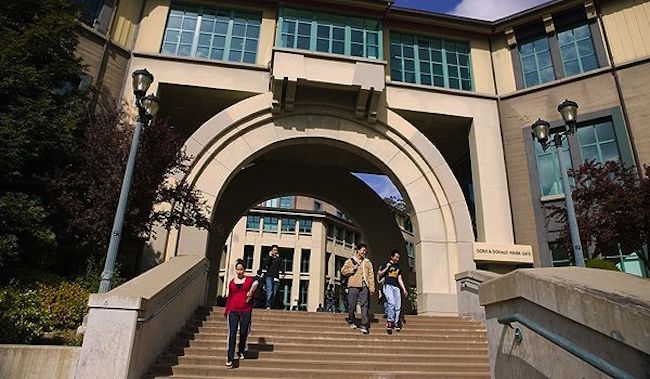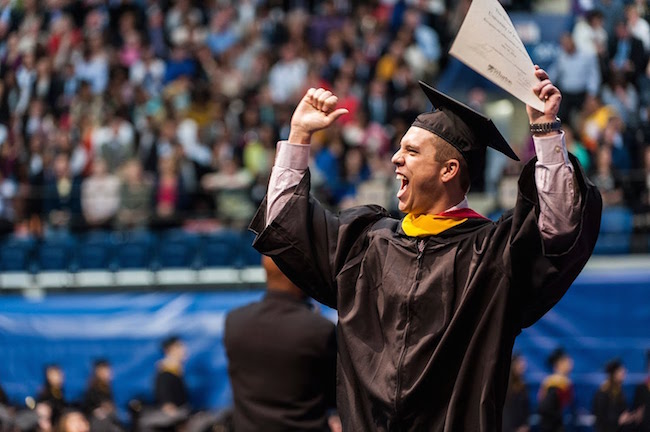
The toughest admission standards for any undergraduate business program is at UC-Berkeley’s Haas School of Business where students are first admitted to the university and then must apply to the B-school in their sophomore year.
MIND-BOGGLING ADMISSIONS RATES AND COMPENSATION
More important than the publication of a ranking, however, Poets&Quants has exhaustively gathered and compiled the most robust set of data ever to be published specific to undergraduate business schools — all of which we are sharing in highly detailed school profiles and other in-depth articles on everything from the most innovative programs to student debt. Among the findings is the fact that four business schools boast admission rates lower than Harvard’s full-time MBA program. Cornell University’s Dyson School of Applied Economics and Management admitted only 7% of applicants this past fall. UC-Berkeley’s Haas School, 8.2%; Wharton, 9%; and Wash. U. just 10.3% — better than Harvard’s 11% acceptance rate. UC-Berkeley’s stringent admission rates, combined with a high percentage of incoming students ranked in the top 10% of their high school class and exceptionally high average SAT scores, buoyed the school to a top finish in the admissions category.
No less startling is the price that employers are willing to pay recent graduates. Eight schools produced students who averaged more than $70,000 in annual salary in their very first jobs after graduating this spring. Wharton’s Class of 2016 topped the pay sweepstakes, with grads pulling down average salaries of $77,566. When signing bonuses are thrown into the mix, a Wharton undergrad can expect to make more than $86,000, soon after flipping their tassels and launching those caps into the sky. The total compensation, combined with job placement rates 90 days after graduation and the percentage of students notching internships before their senior year, vaulted Wharton to the top of the employment category.
Still, college — even business school — is more than acceptance rates and salaries. The college experience is a life-changing time and some schools clearly do it better than others. According to alumni from the Class of 2014, no school does it better than Notre Dame’s Mendoza School which was the only program to rank in the top ten of all 12 core survey questions. The alumni survey was established to look beyond the fundamental program stats and to evaluate the full academic experience through the eyes of those who not only lived it for up to four years but also tested that education in the world of work.
RANKING COMPARISONS ARE EYE-OPENING
Besides Notre Dame and Wash. U., large land grant universities tend to dominate. Indiana University’s Kelley School of Business, UT-Austin’s McCombs School, and the University of Minnesota’s Carlson School round out the top five, respectively. A wide range of schools, however, excelled in delivering an academic experience that exceeded expectations. Business schools whose alumni put them in the top ten of at least half the survey questions include Georgetown, Texas Christian University, Brigham Young University, Southern Methodist University, and Emory University.
How does our ranking compare with others? Consider Minnesota’s Carlson School, long known for offering one of the premier undergraduate business experiences. While the school finished 15th in this year’s U.S. News ranking, it was shockingly 69th in Bloomberg Businessweek’s most recent ranking. On our list, Minnesota Carlson has the 12th best business undergraduate program in the U.S.. The reason for the drastic difference? Bloomberg Businessweek’s flawed employer survey, weighted by 40% and higher than any other category, ridiculously put Carlson at 91st among employers. Yet, 97% of Carlson’s Class of 2016 had accepted jobs within 90 days of graduation, averaging more than $56,000 to start. What’s more, 77% of Carlson’s Class of 2014 had a “signature experience”—such as a major experiential learning class or consulting project—or a meaningful global immersion during their time at Carlson — a higher clip than any other school.
And it certainly goes the other way, too. Carnegie Mellon’s Tepper School ties for sixth place in the U.S. News’ popularity poll. Indeed, Tepper enrolls an incredibly elite group of students. The entering Class of 2016 averaged 1449 on the old SAT scoring format (out of 1600, not including the writing section). Some 72% graduated in the top 10% of their high school class. But only 41% of the Class of 2014 claimed to have had a “signature experience” or meaningful global immersion. What’s more, the school placed toward the bottom in nearly all alumni rating categories, from the effectiveness of the school’s academic and career advising efforts to the helpfulness of the alumni network. The upshot: Carnegie Mellon finished 24th overall despite its stellar admissions standards, placing ninth in that category It also enjoyed great employment outcomes, placing third.
COMMUNITY, FIT, AND EXTRACURRICULARS ARE DECIDING FACTORS FOR WASH. U. ALUM
In evaluating business schools, as well as most things in life, it’s about taking the best data available as well as the opinions of others in the know, and then matching it to what you’re looking for. And that’s exactly what Julian Nicks did when he chose Wash. U. over Wharton and Yale University in 2009. For Nicks, who attended University City High School, a public high school less than two miles from Washington University’s campus, it came down to fit and community. “For most people from the St. Louis community, Wash. U. was a dream school to get into,” says Nicks, 25. Not only was Nicks accepted, both he and his twin brother, Justin, were offered scholarships via the John B. Ervin Scholars Program, which Nicks describes as “a minority pipeline into the university.”
Nicks knew he made a good decision when the late Dean James McLeod, credited with founding the Ervin Scholars Program in 1987, approached him within the first week of orientation. “I had met him maybe once and had never really talked to him,” recalls Nicks, a consultant at Bain & Company’s Chicago office. “And he came up and talked to me about my student profile when I applied as if he had known me for years. He knew where I came from. He knew what I wanted to study. He knew parts of my application. It speaks so much to how the university is invested in getting to know the students.”
Asked why he believes Wash. U. is so highly regarded by students, Nicks is quick to respond with both the academic rigor of the program and the school’s extracurricular activities. “It was working and running student groups,” he explains. “It was working alongside the administration and those extra-curricular and co-curricular activities that prepared me to do the same types of things I do now with clients.”

The University of Pennsylvania’s Wharton School bested every school on employment outcomes, with the highest starting pay packages this year: More than $86,000
‘YOU CAN’T TRICK STUDENTS. THEY CAN SNIFF OUT INAUTHENTICITY’
And so schools like Wash. U., Notre Dame, Georgetown, Indiana, and others are rewarded in our ranking both for their transparency and impact on students’ lives. “You can’t trick students,” insists Josh Perry, the faculty chair of the undergraduate program at Indiana’s Kelley School of Business. “They have an amazing capacity to sniff out inauthenticity. And I think what students find when they get here — from freshman year all the way to senior year — is that our faculty, administrators, and staff are deeply committed to seeing them succeed.” Kelley was solidly among the top ten schools in ten of the 12 alumni survey questions, a feat achieved by only four programs.
Perry credits Kelley’s high placement in alumni satisfaction and academic experience to a top-down approach from administration. “It begins at the top,” Perry tells Poets&Quants. “Our deans have been committed for a number of years on creating the best undergraduate business experience in the country.” Perry says that mindset has set a tone among faculty for a renewed commitment to excellence in and out of the classroom. While Kelley has many unusual attributes, including a faculty of more than 300 professors that is as large as the entire student populations of some ranked business programs, a truly unique facet of the program is having a full-time resident instructional consultant on the payroll. “He is a pedagogical guru. His only job — to the best that I can figure out — is to make us better teachers,” Perry says, noting full-time faculty teach 99% of the courses at Kelley.
For Flanagan at Notre Dame, the “it” factor comes back to values. “For our students, it’s having some greater purpose,” she says. “And that’s in a wide variety of areas. It doesn’t mean the same thing to each student, but there is some meaning about that for each student. And I think it resonates strongly and then comes through in their work ethic. That’s what we experience with them and the feedback we hear from employers as well.”
Of course, no one ranking can ever be perfect. In choosing a school, prospective students and their parents need to consider far more than the numerical rank given a program by even our evaluation standards. Single data points, whether admission standards or employment results, may be more important to you. Perhaps the quality of teaching and the accessibility of faculty may be more critical in your assessment of the best programs. Our school profiles provide a deeper dive into each school’s undergraduate business program and in-depth analysis on each school’s strengths and weaknesses.
(See following page for our full ranking)










